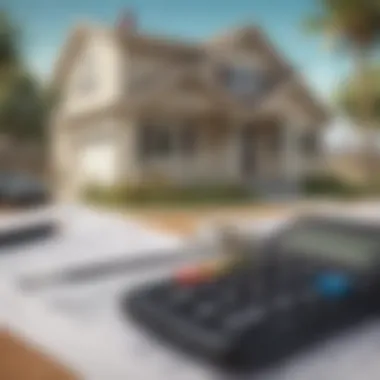Understanding Down Payments for Mobile Homes


Intro
Navigating the world of mobile home financing can feel like a daunting task. For many individuals and families, a mobile home represents not just a roof over their heads, but also an opportunity for stability and investment. Like any major purchase, understanding the financial implications is critical, and down payments play a pivotal role in this process. In this article, we aim to elucidate the essentials surrounding down payments for mobile homes, preparing readers to make informed decisions as they embark on this significant journey.
Typically, the notion of a down payment conjures thoughts of fixed percentages of a purchase price, but for mobile homes, this concept is more nuanced. Various factors come into play, from the type of loan one seeks to the market dynamics in one's region. This article will take a closer look at these elements, offering practical advice and systematic calculations that prospective buyers can use to benchmark their own financial situations.
So, whether you're an investor looking to diversify your portfolio or a family seeking the perfect place to call home, understanding the ins and outs of down payments is crucial.
Key Financial Concepts
Terminology Breakdown
When embarking on your mobile home buying adventure, it's imperative to grasp the terminology that governs this niche market. Terms such as “equity,” “loan-to-value ratio,” and “subprime financing” often emerge and can significantly impact your down payment requirements. Let’s break these down:
- Equity: This refers to the ownership value of the mobile home versus what is owed on it. A larger down payment typically boosts your equity right off the bat.
- Loan-to-Value Ratio (LTV): This is a percentage obtained by dividing the loan amount by the appraised value of the mobile home. Lenders often have stricter LTV guidelines for mobile homes than traditional properties.
- Subprime Financing: If you have a lower credit score, you might need to explore high-interest loans or subprime options, which can affect how much you’re expected to put down.
Understanding Market Trends
Before you make any decisions regarding down payments, it’s worth keeping an ear to the ground on market trends in your area. Mobile home prices vary widely, influenced by factors such as location and demand. Understanding these market dynamics can help you set a realistic budget for your down payment.
Here are a few trends to consider:
- Rising Popularity of Mobile Homes: In recent years, there's been a noticeable shift toward mobile and manufactured homes as more buyers gravitate towards affordable housing solutions. This demand can inflate prices, necessitating a higher down payment.
- Interest Rates: Changes in interest rates can influence both the affordability of loans and the amount of down payment required. Higher rates may lead to lenders demanding larger down payments to offset risk.
- Local Economic Conditions: Regional economic health can inform mobile home prices. If a local economy is booming, expect more competition and potentially higher down payments to move quickly in sales.
"Understanding local trends not only aids in budgeting but also gives moral context to the decision-making process."
Staying informed about these key concepts will not only arm you with the knowledge necessary to make sound financial decisions, but it can also provide a sense of confidence in a market that can often seem unfathomable.
Overview of Mobile Home Financing
Understanding mobile home financing isn’t just for lenders; it’s crucial for anyone contemplating the purchase of this housing alternative. Delving into mobile home financing brings clarity to the process, helping you make informed decisions and avoiding costly mistakes.
Defining Mobile Homes
Mobile homes, often referred to as manufactured homes, differ significantly from traditional site-built homes. These homes are constructed in a factory setting and then transported to a designated site. The primary distinction lies in how they are built and the regulations governing them. Mobile homes are typically cheaper, which can be enticing for first-time buyers or those looking for an affordable option. Plus, they come with various layout choices, ranging from single-section to double-section designs, offering flexibility to suit personal tastes.
Importance of Down Payments
So, why should you care about down payments? Here’s the deal: a down payment is more than just a required upfront cost. It’s a significant factor that influences the loan amount, monthly payments, and potential interest rates.
- A larger down payment can lead to lower monthly payments, easing the financial burden in the long run.
- It demonstrates commitment to lenders, improving creditworthiness and possibly securing better loan terms.
- On the flip side, a minimal down payment may seem convenient but could result in higher monthly payments and interest rates down the line.
"The size of your down payment can be a game changer in mobile home financing; it’s a stepping stone toward building equity."
In summary, understanding these initial steps in mobile home financing sets a solid foundation. It helps in grasping how to budget effectively while aligning expectations with realities. Whether you're an investor or a first-time buyer, knowing the ins and outs of mobile home financing can simplify your path to ownership.
Factors Influencing Down Payments
Understanding the factors that influence down payments can be crucial for anyone considering the leap into mobile home ownership. Not only do these factors impact the initial cash outlay needed, but they can also affect the long-term financial health of your investment. In this section, we will examine the various elements that can sway down payment amounts, including the type of loan you choose, your credit score, the location of the property, the age of the mobile home, and, importantly, the considerations around insurance and taxes. Each of these elements can add layers of complexity to the financing process, helping you paint a clearer picture of what to expect.
Type of Loan


The type of loan you opt for is often the most significant determinant of your down payment. Different types of loans come with varying down payment requirements. For instance, conventional loans generally require higher down payments compared to government-backed loans such as FHA loans, which may allow you to put down as little as 3.5%.
Moreover, some lenders might offer special programs aimed at certain demographics, like first-time homebuyers or low-income families, where down payments could be further minimized. Understanding these options helps you select a loan that best fits your financial scenario. The nuances of each loan type can mean the difference between a comfortable down payment and one that leaves you feeling pinched.
Credit Score Impact
Your credit score can create ripples in the water when determining your down payment. A higher score often translates to lower risk in the eyes of lenders, which might open doors for a reduced down payment. In essence, a robust credit profile could help you qualify for loans that necessitate smaller initial costs. For instance, if your score is advantageous, you stand a chance to negotiate more favorable terms or even get a lower interest rate over the loan's lifespan.
It is important to note, though, that if your credit score falls into a lower bracket, lenders may ask for hefty down payments as a safeguard. This shift could turn an already challenging financial undertaking into an uphill battle. Keeping a close eye on your credit health ahead of time can be a proactive game plan.
Property Location Considerations
Where you choose to place your mobile home can have a profound influence on your down payment requirements. Certain states or even specific counties may have local regulations or lender practices that dictate the financial landscape for mobile homes. For example, homes located in metropolitan areas may face different financing challenges or opportunities than those in rural settings.
Additionally, local housing markets can dictate how resilient your investment may be. If the market is booming, lenders might consider financing that anticipates higher home values; as such, down payments could be linked to these valuations. Also, remember that location influences not just the price, but other housing costs as well—things like upfront fees, property taxes, and homeowner’s insurance can vary enormously.
Age of the Mobile Home
The age of the mobile home plays a subtle but significant role in how much you might be asked to put down. Newer homes often carry less risk compared to older ones. This is mostly because buyers can be more confident in the integrity and the expected long-term value of a newly manufactured home. Thus, lenders may feel secure enough to offer lower down payments for these newer models.
On the flip side, purchasing an older home can lead to higher down payment demands. Lenders might be cautious due to potential depreciation and other inherent risks. If you are considering older mobile homes, budget more for a higher down payment as well as expect additional upfront repair costs to make it livable.
Insurance and Taxes
Lastly, let’s not forget about insurance and taxes. These can either amplify or lessen your initial financial load when buying a mobile home. High insurance premiums or property taxes could drive up your required down payment. Lenders look into these ongoing costs since they are ultimately part of what you’ll be responsible for on a monthly basis. If they see that your insurance costs are steep, they might want a more substantial down payment to cushion their risk.
Additionally, factors like flood zones or areas with high crime rates might worry lenders, pushing them to request a heftier down payment. Assessing insurance costs upfront can help you prepare a more realistic budget.
"A down payment isn’t just a number; it's a first step towards home equity and financial responsibility. Always factor in these nuances before deciding your course of action."
In summary, understanding these factors can help you navigate the financing process with clarity and calm. Recognizing how a loan type impacts your financial obligations, how your credit score can play a pivotal role, where you place your home, its age, and your other obligations like insurance and taxes can all set the stage for a smoother purchasing experience.
Typical Down Payment Percentages
Understanding the typical down payment percentages for mobile homes is pivotal for prospective buyers. It sheds light on financial expectations and planning, allowing buyers to tailor their approach based on both their personal situation and the specifics of the loan. These percentages serve as guidelines. However, the actual amounts might sway depending on individual circumstances, lenders, and loan types. Knowledge of down payment norms can shape a buyer’s strategy and provide insight into their purchasing power.
Conventional Loans
When it comes to conventional loans, which are not backed by government agencies, down payment requirements can fluctuate significantly. Typically, these loans demand a down payment ranging from 5% to 20% of the total purchase price. A larger down payment can lead to lower monthly payments and potentially better interest rates. But achieving the higher end of this range may not always be feasible for every buyer. For instance, a buyer purchasing a mobile home valued at $80,000 might need to put down $4,000 to $16,000. Adjustments in the down payment not only impact upfront costs but also signal the lender's perception of risk.
Government-Backed Loans
Government-backed loans, such as those offered through the Federal Housing Administration (FHA) or the U.S. Department of Agriculture (USDA), generally have more forgiving down payment requirements. Borrowers can often expect to contribute as little as 3.5% to 10% of the home price. The paramount advantage here is accessibility; these loans are designed to help a broader range of buyers, including first-time homeowners or those with less-than-perfect credit.
For example, under an FHA loan, a buyer seeking a mobile home priced at $100,000 might only need to put down just $3,500, making it an attractive option for many. It’s crucial to weigh these down payment options against potential long-term costs, like mortgage insurance, which may be required if the down payment is less than 20%.
Financing Through Dealerships
Financing through dealerships presents a unique scenario as down payment percentages can vary widely. Many dealers are willing to be more flexible with their financing options. The down payment can range anywhere from 10% to 30%, depending on the terms negotiated with the dealership. Often, dealerships entice buyers with promotions that might lower the initial down payment. However, while the allure of low upfront costs seems appealing, it’s essential to scrutinize the overall financing terms because high-interest rates can negate the initial advantage.
Buyers should approach dealership financing with a clear understanding of what any initial payment means in terms of total expenditure. Here’s a snapshot:
- Pros: Potential for lower or no down payments based on promotions, and flexibility in negotiation.
- Cons: Interest rates can be higher, leading to increased total cost over time.


In summary, grasping the typical down payment percentages is essential in navigating the mobile home financing landscape. Whether considering conventional loans, government-backed options, or dealership financing, it's about balancing risks, costs, and your financial landscape.
Determining Your Down Payment
Determining the size of your down payment is a pivotal step in the journey towards owning a mobile home. It's more than just a number; it affects various aspects of home financing, including interest rates, monthly payments, and even your ability to secure a loan. A well-calculated down payment can mean the difference between financial strain and peace of mind down the road.
Assessing Your Financial Situation
At the heart of determining a down payment lies a thorough assessment of your financial situation. This step involves compiling a detailed overview of your income, expenses, and overall financial health. Bewaring of potential hidden costs is essential here. Take into account your monthly bills, debts, and any upcoming expenses that could affect your cash flow.
Consider the following pointers when assessing your financial state:
- Monthly Income: What’s your net income after taxes? How stable is it?
- Expenses: List both fixed and variable expenses. Subtract these from your income.
- Debt-to-Income Ratio: This ratio will help lenders gauge your ability to repay your mortgage. Generally, a lower ratio is more favorable.
- Emergency Fund: Having enough savings set aside for unexpected costs can provide additional security when it comes time to make that down payment.
Calculating the Required Down Payment
Once you’ve gauged your financial situation, calculating the actual down payment becomes clearer. The required down payment for mobile homes can range quite a bit, often falling between 5% and 20% of the purchase price. However, this amount varies by the type of loan and lender preferences.
To make it straightforward, use this formula:
- Determine Purchase Price: Start with the mobile home’s purchase price.
- Choose Down Payment Percentage: Based on your financial assessment, decide what percentage you can feasibly afford.
- Calculate the Amount: Multiply the purchase price by the percentage chosen. For example:
Don’t forget to take into account that some lenders may have specific requirements based on different loan programs.
Strategies for Saving for a Down Payment
If you find your calculated down payment requires stretching your savings, implementing saving strategies can be beneficial.
- Set Up a Dedicated Savings Account: Allocate funds specifically for your down payment. This way, you avoid mixing it with your regular expenses.
- Automate Transfers: Set up automatic transfers from your main account to your savings account right after payday. Out of sight, out of mind!
- Cut Unnecessary Expenses: Review your discretionary spending. Can you reduce dining out or subscriptions? Even small amounts can add up over time.
- Consider Side Hustles: Engage in freelance work, tutoring, or any part-time gigs to earn extra cash directed toward your down payment.
- Research Grants or Assistance Programs: Depending on your circumstances, there may be financial aid grants available for home buyers, especially for those purchasing mobile homes. Visit sites like reddit.com and facebook.com to find communities or groups that share tips and potential resources.
By carefully assessing your financial capacity, calculating what’s required down payment wise, and employing smart savings tactics, you’re empowering yourself for that small step leading to home ownership. As always, planning ahead can yield significant long-term benefits.
"Success is where preparation and opportunity meet." - Bobby Unser
Implications of Down Payment Size
The size of your down payment can have far reaching implications on your journey to owning a mobile home. This decision affects not just the initial cost, but also shapes your long-term financial health. Understanding these implications is crucial for making informed choices that align with your financial objectives.
Effects on Monthly Payments
When you fork over a larger down payment, you’re effectively reducing how much you need to borrow. This translates to lower monthly payments. For example, if you purchase a mobile home priced at $100,000 with a down payment of 20%, you secure a loan for merely $80,000. In contrast, if you only manage 5%, your loan rises to $95,000. Though the stated monthly payments might look close at first glance, over years they could lead to a significant difference in your cash outflow.
Additionally, lenders often extend more favorable interest rates for those who present heftier down payments. A smaller deposit might land you with a higher interest rate, which can further inflate your monthly payments. Lenders view larger down payments as less risky, hence they might reward you with lower rates, saving you both now and down the line.
Long-Term Financial Impact
Your initial down payment isn't just a one-off expense; its ripple effects can be felt throughout the life of the loan. A larger down payment can lead to substantial savings in interest payments over the loan's duration. For instance, if we take that same $80,000 mortgage obtained with a 4% interest rate, you might end up paying nearly $35,000 less in interest over 30 years compared to a scenario where you borrowed $95,000. That’s no small change, particularly when you factor in inflation and the potential loss of other investment opportunities.
Moreover, a smaller down payment can put you in a tighter financial position as you juggle monthly payments, maintenance, and other expenses. This could lead to a cycle of debt that's difficult to shake off. An increased financial burden may inhibit your ability to save or invest for retirement, eroding your future wealth.
Potential for Equity Building


Equity represents the ownership you have over your mobile home. The more substantial your down payment, the more equity you build right from the get-go. This is crucial, especially as mobile homes tend to depreciate in value unlike traditional homes that usually appreciate over time.
With a higher down payment, you're not only starting with better equity, but you also can leverage that equity for future financial needs, like purchasing a new vehicle or getting a loan for renovations.
- Generally, securing a mobile home with more equity provides room for financial maneuvering in the years to come.
- Having significant equity also shields you against market fluctuations. If home values dip, those with fatter equity margins are often better positioned to ride out the downturn without facing dire financial consequences.
In summary, understanding the implications of your down payment size is paramount. The immediate effects on monthly payments, long-term financial burdens, and potential for equity growth shape not just your mobile home purchase but your broader financial future as well.
Knowing how a larger down payment can buoy your financial position can guide you towards healthier economic decisions moving forward. Be thorough in assessing your financial landscape and choose a down payment strategy that fortifies your financial goals.
Common Mistakes to Avoid
When venturing into the landscape of mobile home financing, it’s crucial to sidestep common pitfalls that can lead to unnecessary headaches and financial strain. Gaining insight into the possible missteps not only prepares buyers for a smoother sailing but also empowers them with the knowledge to make informed decisions. Avoiding these mistakes can save you time, money, and a whole lot of stress down the line.
Underestimating Costs
One of the big blunders potential buyers often make is underestimating the financial commitments involved in a mobile home purchase. It’s easy to focus on the down payment and initial loan payments, but this can be a slippery slope. Many buyers overlook additional costs that can quickly add up. Here are some factors you should consider:
- Closing Costs: These can include fees for appraisal, title insurance, and various administrative charges. Expect this to range from 2% to 5% of the purchase price, depending on the lender and location.
- Ongoing Maintenance: Unlike traditional homes, mobile homes require specific upkeep. This covers anything from skirting repairs to potential roof work. Not factoring this in could lead you to being caught off guard.
- Insurance: Mobile home insurance can vary greatly from standard home insurance. If you don’t include this in your budget, you may face surprises post-purchase.
- Utilities and Land Costs: If you plan on renting land or placing your mobile home on a lot, be sure to account for any rental fees or land taxes.
"Planning a budget only for the initial down payment is like packing for a trip without considering the luggage fees - it can cost you a fortune later on."
By tackling your budget holistically and preparing for these extra expenses, you place yourself in a better position for success.
Ignoring Financial Counseling
It can be tempting to navigate the financing waters of mobile home purchases alone. However, skipping financial counseling can leave you adrift without the necessary guidance. Seeking advice from a financial counselor or advisor provides invaluable benefits:
- Personalized Financial Planning: A professional brings a tailored approach to examining your financial situation, understanding your income, debts, and lifestyle, allowing for a more strategic down payment plan.
- Improved Credit Understanding: They can also shed light on how your credit score directly impacts your financing options, helping you to strategize improvements well ahead of your application.
- Access to Resources: Financial counselors often have tools and resources that can illuminate various loan options and down payment assistance programs that you may not discover on your own.
In the end, bypassing financial counseling could not only cost money but also lead to a lack of confidence in your financial decisions. The insights gained can provide a clearer picture of what to expect and how best to prepare for your mobile home financing journey.
Future Trends in Mobile Home Financing
As the landscape of real estate evolves, the financing of mobile homes is transforming in ways that many prospective buyers may not have anticipated. Understanding these trends is crucial for those looking to invest in mobile home properties. With shifts in consumer attitudes and financial strategies, buyers will find themselves navigating an increasingly flexible and diverse marketplace. This section sheds light on the trends shaping the future of mobile home financing, emphasizing the importance of staying informed in order to make savvy investment decisions.
Growing Acceptance of Mobile Homes
Once relegated to a niche market, mobile homes are gaining ground as a legitimate form of housing. This growing acceptance flows from an increasing awareness of not just the affordability but also the lifestyle benefits they offer. As quality construction techniques improve, many modern mobile homes rival traditional homes in aesthetics and features. Investors can note that municipalities are also changing zoning regulations to accommodate these homes more favorably.
In fact,
more people are considering mobile home ownership due to the myriad of advantages they present:
- Affordability: Lower price points compared to traditional houses make them accessible for a larger portion of the population.
- Flexibility: Buyers can choose to relocate their mobile homes, something not feasible with traditional structures.
- Community Living: Many mobile home parks create a sense of community, attracting those seeking a closer neighborhood vibe.
As acceptance grows, institutions like banks and credit unions are adapting their policies to meet the needs of mobile home buyers, encouraging an uptick in financing options tailored specifically for this segment.
"The shift towards acceptance of mobile homes is not just about affordability; it's about evolving perceptions of quality and value in housing."
Evolving Loan Options
Alongside this acceptance is the continual evolution of financing options available for mobile homes. Gone are the days when obtaining a loan for a mobile home felt like pulling teeth. With the increase in popularity, lenders are stepping up to the plate, offering a range of loan products specifically designed for mobile home purchases.
There are several key advancements in loan offerings:
- FHA and VA Loans: Many buyers are now eligible for government-backed loans that offer favorable terms. This might include lower down payment requirements and better interest rates than traditional loans.
- Chattel Financing: For those who own the land or are looking to lease space, chattel loans provide an affordable way to finance the mobile home itself without bundling in land costs.
- Financing Through Dealerships: Some buyers might explore financing options that mobile home dealerships provide. This can sometimes streamline the purchasing process, making it easier for buyers.
With more avenues to secure funds, prospective buyers are better equipped to make investments in mobile homes without the gut-wrenching anxiety often associated with securing traditional home financing. This greater variety not only enhances accessibility but also enables buyers to tailor loans to their unique situations.
As mobile home financing continues to adapt, awareness of these trends can empower buyers and investors alike, making informed choices distinctively easier in what was once a challenging domain.















